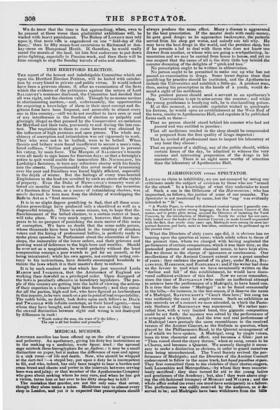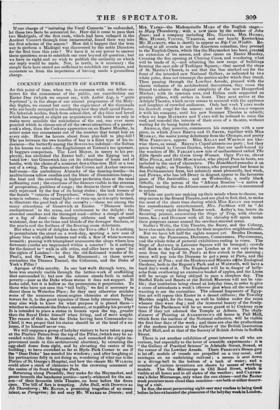HARMONICON versus SPECTATOR.
LAYING no claim to infallibility, we are not annoyed by seeing our criticisms made the subject of criticism by those who are armed for the attack " by a knowledge of what they undertake to treat of. Such a one is the Dilletante of the Harmonicon; who has impeached, as follows, the justice of some of our remarks.. The Spectator is not mentioned by name, but the "cap" was evidently intended to " fit" us.
" A Weekly Paper, in whose well-delivered musical opinions I generally con- cur, has attached in rather strong language, the first Ancient Concert of this season, and in pretty phliu terms accused the Directors of imitating the Vocal Concerts, by the introduction of Madrigals. Surely the writer has not care- fully looked over the books of the Ancient Concert ; or made himself acquainted with the fact, that nearly sixty year ago, Madrigals were among its most Ma,- purtant features, and have, more or less often, continued to be performed up tlY the present time."
What the Directors of sixty years ago did, it is obvious has no bearing upon the question at issue; which solely refers to those of the present time, whom we charged with having neglected the performance of certain compositions, which it was their duty, as the pretended patrons of' ancient classical music, to have kept alive. But we demur to the charge of -ignorance or carelessness. Our recollections of the Ancient Concert extend over a great number of years : they embrace the period of its glory; under MARA, BIL- LINGTON, HARRISON, and BARTLEMAN; and if the writer had done us the favour to read what we have occasionally written on the "decline and fall" of this establishment, he would have disco- vered sufficient evidence of this fact. Now we never remember, since the time of BARTLEMAN (who made an ineffectual attempt to achieve here the performance of a Madrigal), to have heard one. It is true that the name " Madrigal " is to be found occasionally in. the bills,—for instance, in the last season, if it deserve the name of a Madrigal, RAVENSCROFT'S " Cans't thou love ;" but sung (as was uniformly the case) by single voices. Such an exhibition as this reminds us of a concert we once attended, in which the Pasto- rale Sinfonia of BEETHOVEN was announced. We rather mar- velled how, with a very limited band, this gigantic composition could be set forth: the mystery was solved by the performance of it arranged as a Quintet. And the true and real performance of a Madrigal tears precisely the same resemblance to the received version of the Ancient Concert, as the Sinfonia in question, when played by the Philharmonic Band, to the Quintet arrangement-of it of which we have spoken. A Madrigal, sung by single voices, loses its true character and effect, and becomes a Glee: just as "Thus round about the starry throne," when so sung, ceases tnbe a Chorus, and becomes a Quartet. We scarcely thought it neces- sary to make a distinction so obvious, in order to guard ourselves from being misunderstood. The Vocal- Society revived the per- formance of Madrigals; and the Directors of the Ancient Concert endeavoured to follow in the same track, but gaud p.assizss cvquis. They first committed them to the clutches of their chorus4ingers, both Lancashire and Metropolitan,—,by wboniihey were femoese- lessly sacrificed : they then. turned for aid to the young ladies and gentlemeu of the Academy; but, alas ! they were above sing ing the, old-fashioned trumpery of MORLEY and WILBYE ; and the . whole affair ended (as every one must have anticipated) in a failure. The performance was coldly received by the audience' .as it de- served to be; and Madrigals have been withdrawn frointhe bills If our charge of "imitating the Vocal Concerts" be unfounded, let these two facts be accounted for. How did it come to pass that two Madrigals, of the first rank, which bad been unheard, in the Ancient Concert through time immemorial, found their way into the first scheme of the season? How did it happen that the true waYlo.Perforni a Madrigal was discovered by the noble Directors for the first time this year? We have it in our power to answer these questions so as to establish our case beyond all question ; but we have no right and -no wish to publish the authority on which our -reply would be made. Nor, in truth, is it necessary : the simple facts here stated are sufficient to establish our position, and exonerate us from the imputation of having made a groundless charge.





















 Previous page
Previous page